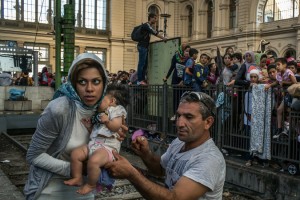Migrant Crisis Gives Germany Familiar Role in Another European Drama
< < Go Back
When the authorities in Hungary prevented hundreds of migrants who had overwhelmed the central Keleti station in Budapest from boarding trains for Germany this week, it nearly set off a riot. Outside the station, the migrants were chanting: “Germany! Germany!”
That is where so many of them want to go.
In this summer’s migrant crisis — as with the unfinished debt crisis in Greece and the confrontation with Russia over Ukraine — Germany once again finds itself at the center of a European drama, compelled or condemned to lead by its wealth and size and by the lack of leadership from Brussels and other states in the European Union.
As Germany struggles to find consensus on the migrant crisis, a familiar dynamic is playing out, with Berlin pushing its partners to live by rules that not everyone is inclined to follow.
That tension has, in some sense, made both the Greek and migrant crises two sides of the same problem. The Greeks lived large borrowing in euros, which Germany backed with its sterling credit, and then challenged Germany’s demands for harsh austerity when it ran into financial problems.
Similarly, people in the eastern reaches of Europe have enjoyed unfettered access to the big German market. But they have balked at Germany’s evolving demands for how to grapple with non-European migrants crisscrossing their lands on their way to seek asylum or work in Europe’s wealthier core.
“Ukraine, the Greek question and the migrant issue show how powerful Germany has become in Europe against its own will, how central the German government is to solve these big European questions,” said Christoph Schult of the German newsmagazine Der Spiegel. “I think the chancellor is not particularly happy about that role and would prefer others to collaborate or take the lead.”
More From The New York Times:




